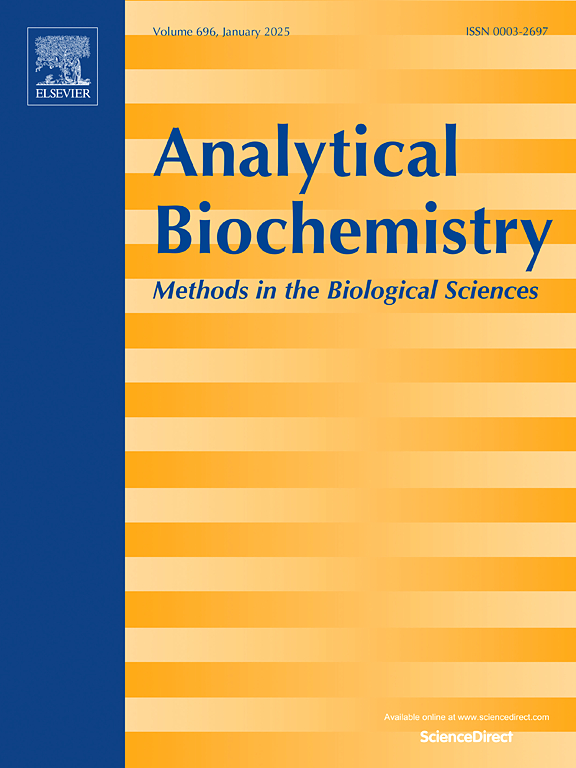A highly sensitive creatine kinase detection in human serum using 11-mercaptoundecanoic acid modified ITO-PET electrodes
IF 2.6
4区 生物学
Q2 BIOCHEMICAL RESEARCH METHODS
引用次数: 0
Abstract
The enzyme creatine kinase (CK) is a biomarker that plays an extremely significant role in the early detection of cardiovascular disorders. Serum levels of CK are regularly monitored in patients with heart attacks, one of the most critical cardiovascular illnesses. In this study, a highly sensitive electrochemical immunosensor system was designed for the importance of early diagnosis of CK. This immunosensor system was developed by immobilizing 11- mercaptoundecanoic acid (11-MuA) on disposable indium tin oxide–polyethylene terephthalate (ITO-PET) electrodes. Electrochemical impedance spectroscopy (EIS), cyclic voltammetry (CV) and single frequency impedance (SFI) techniques were utilized throughout the immobilization process during the construction of the immunosensor. In addition, the proposed CK immunosensor system involves thorough analytical research, which may include linear determination range, repeatability, reproducibility, square wave voltammetry, storage capability, and regeneration. The suggested immunosensor was also characterized using scanning electron microscopy (SEM). The proposed immunosensor system demonstrated a broad dynamic range (0.1 pg/mL – 100 pg/mL), as well as a low limit of detection (LOD) and a low limit of quantification (LOQ) of 0.018 pg/mL and 0.0394 pg/mL, respectively. Finally, the immunosensor was tested on human serum samples, proving that it could be utilized in clinical situations.

使用11-巯基十四酸修饰ITO-PET电极检测人血清中高灵敏度肌酸激酶。
肌酸激酶(CK)是一种生物标志物,在心血管疾病的早期检测中起着极其重要的作用。心脏病是最严重的心血管疾病之一,在心脏病患者中,血清CK水平被定期监测。鉴于早期诊断CK的重要性,本研究设计了一种高灵敏度的电化学免疫传感器系统。该免疫传感器系统是通过将11-巯基十四酸(11- mua)固定在一次性氧化铟锡-聚对苯二甲酸乙二醇酯(ITO-PET)电极上开发的。在构建免疫传感器的整个固定过程中,采用了电化学阻抗谱(EIS)、循环伏安法(CV)和单频阻抗(SFI)技术。此外,拟议的CK免疫传感器系统涉及深入的分析研究,其中可能包括线性测定范围,可重复性,再现性,方波伏安法,存储能力和再生。所提出的免疫传感器也用扫描电镜(SEM)进行了表征。该免疫传感器系统具有较宽的动态范围(0.1 pg mL-1 ~ 100 pg mL-1),低检测限(LOD)和低定量限(LOQ)分别为0.018 pg mL-1和0.0394 pg mL-1。最后,对人体血清样本进行了测试,证明该免疫传感器可用于临床。
本文章由计算机程序翻译,如有差异,请以英文原文为准。
求助全文
约1分钟内获得全文
求助全文
来源期刊

Analytical biochemistry
生物-分析化学
CiteScore
5.70
自引率
0.00%
发文量
283
审稿时长
44 days
期刊介绍:
The journal''s title Analytical Biochemistry: Methods in the Biological Sciences declares its broad scope: methods for the basic biological sciences that include biochemistry, molecular genetics, cell biology, proteomics, immunology, bioinformatics and wherever the frontiers of research take the field.
The emphasis is on methods from the strictly analytical to the more preparative that would include novel approaches to protein purification as well as improvements in cell and organ culture. The actual techniques are equally inclusive ranging from aptamers to zymology.
The journal has been particularly active in:
-Analytical techniques for biological molecules-
Aptamer selection and utilization-
Biosensors-
Chromatography-
Cloning, sequencing and mutagenesis-
Electrochemical methods-
Electrophoresis-
Enzyme characterization methods-
Immunological approaches-
Mass spectrometry of proteins and nucleic acids-
Metabolomics-
Nano level techniques-
Optical spectroscopy in all its forms.
The journal is reluctant to include most drug and strictly clinical studies as there are more suitable publication platforms for these types of papers.
 求助内容:
求助内容: 应助结果提醒方式:
应助结果提醒方式:


